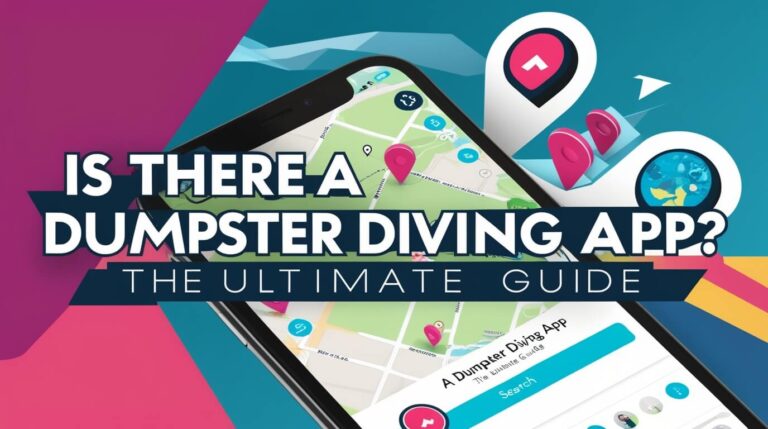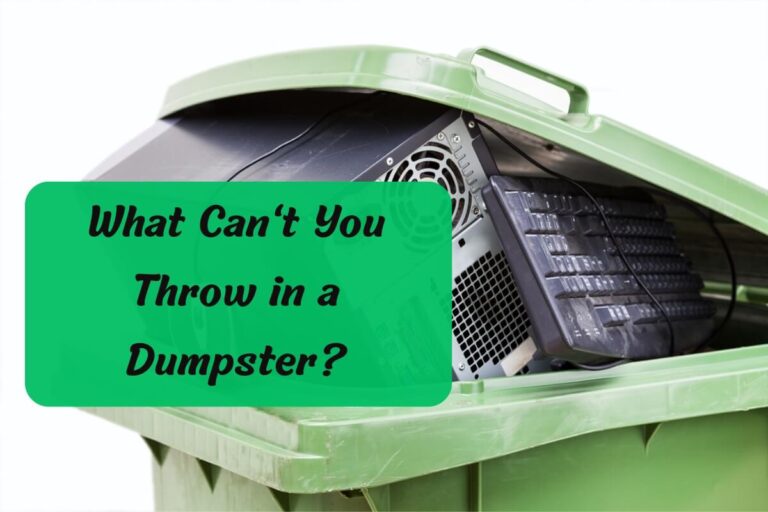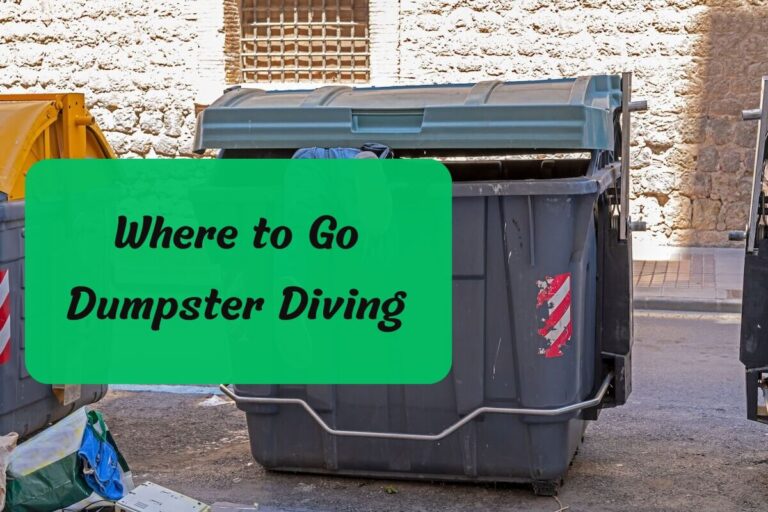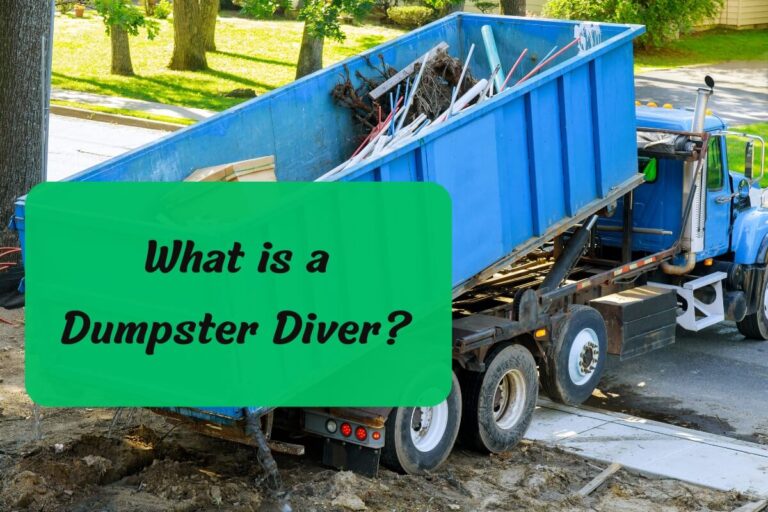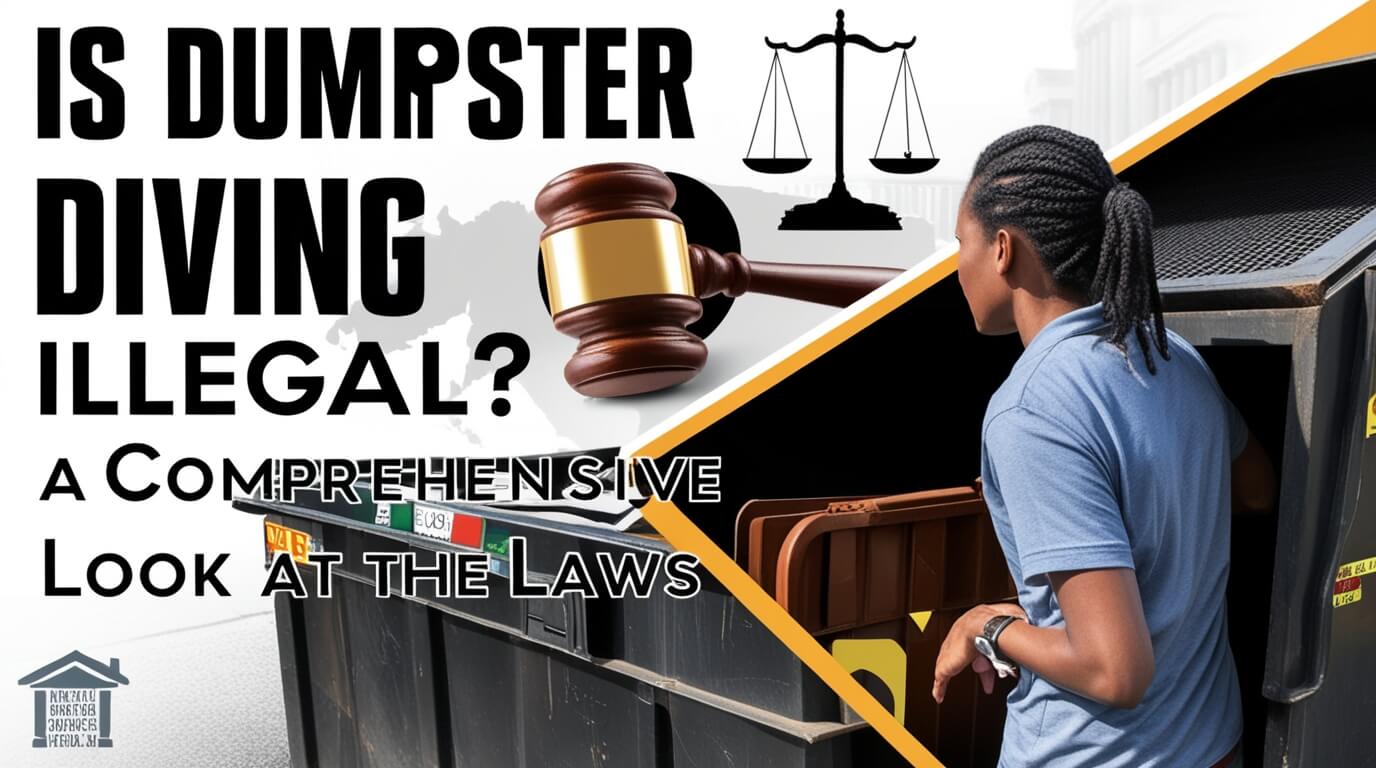
In today’s eco-conscious world, many people are looking for ways to reduce waste and live more sustainably. One practice that has gained popularity is dumpster diving – the act of rummaging through commercial or residential dumpsters and trash bins to find discarded but still usable items.
While dumpster diving may seem like a harmless way to score free goods and keep things out of landfills, its legality is often questioned. Is dumpster diving a crime? The short answer is: in most cases, no – dumpster diving on public property is legal in the United States. However, there are some important laws and restrictions to be aware of that can make it illegal in certain situations.
This article will take a comprehensive look at the legality of dumpster diving across the country. We’ll examine the key factors that determine if dumpster diving is allowed or not, which states have restrictions, the potential consequences of getting caught, and tips for legally and safely going dumpster diving.
What is Dumpster Diving?
Dumpster diving, also known as skip dipping or binning, refers to the practice of sifting through trash receptacles like dumpsters and trash cans to find and collect discarded items that may still have value or usefulness. Common finds include furniture, electronics, books, clothing, food, and other household items.
People dumpster dives for various reasons. Some do it to find free, reusable goods to reduce waste and save money. Others resell valuable finds to make extra income. Dumpster diving can also be a way to source materials for crafting, art projects, or other creative endeavors.
Is Dumpster Diving Legal or Illegal in the United States?
In 1988, the Supreme Court case California v. Greenwood established that there is no reasonable expectation of privacy for discarded items left on public property for trash collection. This landmark ruling essentially made dumpster diving legal on a federal level when done on public property.
However, the legality of dumpster diving can vary from state to state and even city to city based on local laws and ordinances. Some key factors that determine if dumpster diving is allowed or considered illegal trespassing or theft are:
Key Factors Determining If Dumpster Diving is Legal
Public vs. Private Property
Dumpster diving is generally permissible if the dumpster or trash receptacle is located on public property like streets or sidewalks. However, it may be considered trespassing if the dumpster is on private property belonging to a business or residence.
Presence of “No Trespassing” Signs
Areas marked with posted “No Trespassing” or similarly worded signs prohibit dumpster diving, as ignoring such signage would be criminally trespassing on that private property.
Locked or Fenced-Off Dumpsters
Dumpsters that are locked or completely fenced off restrict public access, making dumpster diving in those areas illegal.
Local Ordinances Prohibiting Removal of Recyclables
Some states and cities have ordinances preventing people from taking recyclable materials left out for municipal recycling collection.
Laws Against Littering/Disorderly Conduct
Even in areas where dumpster diving itself is legal, you could potentially face charges like littering or disorderly conduct if complaints are filed about making a mess or causing a disturbance.
States Where Dumpster Diving Is Legal on Public Property
In most U.S. states, dumpster diving is perfectly legal as long as it is done on public property that is freely accessible without trespassing, and local ordinances don’t prohibit it.
Some major states where dumpster diving on public land is allowed include:
- New York
- Texas
- California
- Florida
- Illinois
- Pennsylvania
Check local city rules before dumpster diving, as some cities have restrictions even if state law allows it.
States with Restrictions on Dumpster Diving
While dumpster diving may not be outright illegal at the state level, some states do have certain laws that place restrictions on the practice:
New York
In New York State, it is illegal to disturb or remove recyclable materials that have been left for curb-side collection by the Department of Sanitation. Essentially, taking things like bottles, cans, papers, etc. from residential recycling bins is prohibited.
States with Bottle Deposit Laws
States like California, Michigan, Oregon, and several others have “bottle deposit” laws in place. This requires consumers to pay a small refundable deposit (usually 5-15 cents) when purchasing beverage containers. It then becomes illegal to collect recyclable bottles and cans from out-of-state in an attempt to redeem the deposits in bottle deposit states.
Dealing with “No Trespassing” and Locked Dumpster Areas
If a dumpster or collection of trash bins is located on clearly marked private property with “No Trespassing” signage, attempting to access those areas for dumpster diving would be criminal trespassing in most jurisdictions.
The same goes for dumpsters that are locked or completely fenced off and restricted from public access. Bypassing locks, fences, or other barriers to get to a dumpster on private property is illegal.
When dumpster diving, be sure to respect all posted signage and physical barriers. If an area is marked as private and off-limits to the public, it’s best to avoid going near those dumpsters, even if it seems like there could be good finds inside.
What If I’m Caught Dumpster Diving?
Even in locations where dumpster diving itself isn’t expressly prohibited, you could still potentially face consequences like citations, fines, or even arrest if caught in the act on properties where it is not permitted.
Common charges dumpster divers may face include:
- Trespassing – If diving in dumpsters on private property
- Petty Theft – For taking items discarded by owners/businesses
- Disorderly Conduct – If complaints are made about making excessive noise, littering, etc.
In the best-case scenario, you may simply be asked to leave the premises if caught dumpster diving in an unauthorized area. But in some cases, dumpster divers have faced more serious charges like loitering, breaking, or even robbery depending on the circumstances.
The penalties can range from fines and citations up to jail time for repeat offenses. The severity depends on how strictly the local laws treat dumpster diving activities that could be seen as trespassing or petty crimes.
To avoid any legal troubles, it’s crucial to understand and follow all local laws and regulations surrounding dumpster diving before rummaging through any trash receptacles.
Dumpster Diving for Personal/Financial Information
Never take personal and financial information from dumpsters, no matter what.
Attempting to dumpster dive with the intent of collecting things like:
- Bank statements
- Credit card information
- Tax documents
- Medical records
- Other personal identifying data
To commit identity theft, fraud, or any other criminal activity is 100% illegal. This practice is known as “dumpster diving for personal information” and can result in serious criminal charges.
Numerous cases around the U.S. have seen “dumpster divers” prosecuted for identity theft and fraud-related crimes after illegally obtaining victims’ personal, financial, or medical data from discarded documents.
Not only is this activity unethical, but it violates numerous state and federal laws aimed at protecting consumer privacy and preventing identity-related crimes. Always leave any personal paperwork or electronics with data storage untouched.
Tips for Legally and Safely Dumpster Diving
For those interested in trying dumpster diving while staying firmly within legal boundaries, here are some important tips to keep in mind:
Research Local Laws First
Before dumpster diving, thoroughly research the local ordinances in your city and state. Understand where public property ends and private property begins to avoid trespassing issues.
Stick to Public Areas Only
Only dumpsters dive in publicly accessible areas like alleyways, sidewalks, and parking lots. Avoid residential areas and business properties unless you have explicit permission.
Don’t Take Recyclables (If Prohibited)
In areas with ordinances against taking recycled materials or bottle deposits, leave those items alone even if you find them in a dumpster.
Be Cautious Around Private Businesses
While some retailers are dumpster diver-friendly, others are not. Proceed carefully around business dumpsters and don’t ignore any posted signage.
Ask for Permission at Residences
As a courtesy, it’s best to get permission from homeowners before rummaging through residential trash bins, even if local laws technically allow it on public property. Dumpster diving on someone’s private residential property without approval could be considered trespassing.
Be Safe and Clean Up After Yourself
Dumpster diving does come with some risks like potential injury from sharp objects, hazardous materials, or unsanitary conditions. Take proper precautions like wearing gloves and being mindful of your surroundings.
Clean up after dumpster diving, as leaving a mess can be considered littering in some areas.
Only Take What You’ll Use
Part of the ethical dumpster diving philosophy is about reducing waste, not creating more of it. Only take items you have a legitimate use for, whether that’s for personal use, repurposing, reselling, or donating to others in need.
Leaving perfectly good items behind can defeat the purpose of dumpster diving in the first place. Be selective in what you retrieve.
Don’t Dumpster Dive at Hospitals/Medical Facilities
As a general rule, it’s unwise (and likely illegal) to dumpster dive at any hospitals, clinics, or medical facilities that may improperly discard confidential patient data and bio-hazardous medical waste.
Consider The Ethics
While dumpster diving can have benefits for reducing waste, it’s understandable that some businesses and property owners may not appreciate having their discarded items picked through.
If dumpster diving in marginal areas, consider the ethical implications and don’t take anything you wouldn’t be comfortable explaining if confronted by an owner or authorities.
Conclusion
In conclusion, dumpster diving itself is legal in most states across the U.S. as long as it is done on public property without trespassing on private land or violating any local ordinances. However, there are restrictions to be aware of depending on where you live.
The key is to thoroughly understand your area’s specific laws and respect posted signage and property boundaries. With some due diligence, it’s possible to legally dumpster dive for free or resellable items while avoiding any run-ins with authorities.
Just be sure to steer clear of any unethical practices like dumpster diving for personal information to commit fraud, raiding medical facility dumpsters, or making excessive messes. Follow the tips above for legally and responsibly taking part in this waste-reducing practice.
At the end of the day, dumpster diving can be a way to acquire useful goods and materials while helping divert still valuable items from overcrowded landfills. As long as it’s done carefully and legally, it can be an ethical way to embrace sustainable living.

